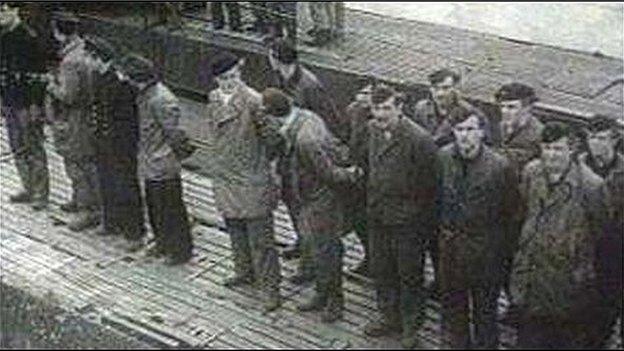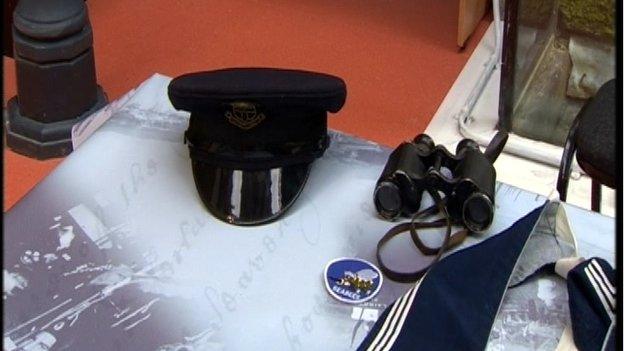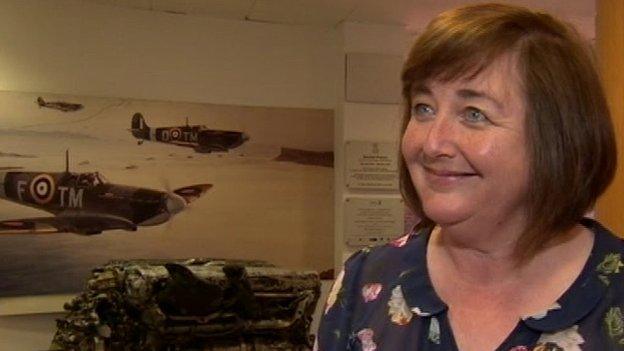Londonderry: The day the U-boat crew surrendered
- Published
BBC News NI's Keiron Tourish reports
A retired priest has described how he peered through the periscope of a surrendered German U-boat as he was given an exclusive tour days after Hitler's Atlantic fleet berthed for the last time.
Fr Arthur O'Reilly, was 13 and on a break from exams when he got his chance.
The U-boats were moored on the banks of the River Foyle in Londonderry after their crews surrendered at the end of World War Two, 70 years ago this weekend.
The German submariners were taken to an army camp in County Down and the people of Derry had a chance to explore the submarines.
Fr O'Reilly scrambled through narrow compartments of the U-boat past signs bearing the warning "Achtung!"
As he looked through the periscope, he was amazed at how clearly he could see people on the docks.
A British naval officer showed him around the vessel.

The crew of a German U-boat - crews from about 60 German submarines surrendered at Lisahally during World War Two
"He allowed me to look through the periscope and I could see people walking on the quay. You could identify people, I was amazed at the technology, you could see people's features," he said.
He said the U-boat was small and quite confined.
"I wondered how did they fit 30 personnel into the small space?
"They shared the bunks (between shifts), there was a shelf between each compartment, with signs saying Achtung!

An array of memorabilia will be on display
"The shelf was to prevent flooding, you had to step over it, there were these apertures from one section to the next.
"I saw the torpedo bays, they were deactivated at that time, I saw the navigation instruments - it was very exciting for a schoolboy to see all these things that you had read about in the papers and heard on the radio."
Fr O'Reilly said: "It was very sad that there was such loss of life. It was a tragic consequence of the war and the belligerence between nations.
"It was a great feeling that the war was over and that there would be no more destruction or loss of life, at least that was a consolation."
Derry was once one of the command centres, close to the Atlantic's Western Approaches where so-called "wolf-packs" of the stealthy underwater machines had wrought such damage on British shipping.

Margaret Edwards said the surrender put Derry on the map
The city is marking the anniversary of the German surrender with a festival of film and old memorabilia.
Among the artefacts are a set of dark green binoculars captured from a submarine, photographs of German sailors, an accordion and pictures of the submarines tied up in the city.
It was on 14 May 1945 that the first of the U-boats made their way up the Foyle to the port of Lisahally where they were formally ordered to surrender by Admiral Sir Max Horton, commander-in-chief, Western Approaches.
Margaret Edwards, from Derry and Strabane District Council's museums service, said: "For Sir Max Horton to come here to accept that surrender put Derry on the map as a place that had to be remembered for the role it played."
The images were donated to Derry City and Strabane District Council Museum Services earlier this year
Muriel Nevin, 91, was stationed on the outskirts of the city and working for the Women's Royal Naval Service.
She said the city was a special place where the warm welcome made the base a second home for visiting troops from England, Canada and the US.
She was Liverpool-born and joined the Wrens during the Battle of Britain, lying about her age to get in.
"I quickly came over to Northern Ireland and was posted with the A36 and A37 Fleet Air Squadron in Maydown. The atmosphere was great. Everybody helped everybody, no matter who you were," she said.
"I remember the dances and all the lovely music. There were, of course, sad moments when you heard of people being killed and ships going down, but you had a job to do and you did it."